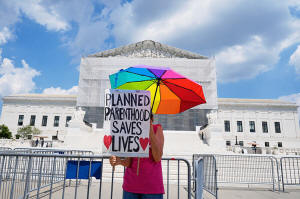Judge to hear arguments on law cutting Planned Parenthood Medicaid funds
[November 12, 2025]
By SAFIYAH RIDDLE
A federal judge will hear arguments Wednesday about whether a spending
law passed in July that ended Medicaid reimbursements for Planned
Parenthood can remain in effect while legal challenges continue.
President Donald Trump's tax and spending cut bill targets organizations
that both provide abortions and receive more than $800,000 a year in
Medicaid reimbursements. Planned Parenthood has argued the law violates
the Constitution, while anti-abortion activists applauded the
legislation.
An appeals court ruled that the law could go into affect in September
while a lower court considered Planned Parenthood's claims.
In a report released Wednesday morning ahead of the hearing, Planned
Parenthood said the legislation cost $45 million in September alone as
clinics across the country paid for treatment for Medicaid patients out
of pocket — a rate that the organization says is unsustainable.
Nearly half of Planned Parenthood’s patients rely on Medicaid for health
care aside from abortions, which was already not covered by the federal
insurance program that serves millions of low-income and disabled
Americans.
Legal fight
Planned Parenthood Federation of America and its member organizations in
Massachusetts and Utah, as well as a major medical provider in Maine,
filed lawsuits against Health and Human Services Secretary Robert F.
Kennedy Jr. in July. The Maine provider has been forced to stop it's
primary care services while its lawsuit works its way through the
courts.

In the meantime, seven states — California, Colorado, Massachusetts, New
Jersey, New Mexico, New York and Washington — have directed state funds
to compensate for lost federal Medicaid reimbursements.
That has covered roughly $200 million of the $700 million that the
organization spends annually on Medicaid patients, according to Planned
Parenthood.
In light of the shortfall, some clinics will force Medicaid patients to
pay out of pocket while others will close altogether, adding to the 20
Planned Parenthood affiliated clinics that have closed since July and
the 50 total that have closed since the start of Trump’s second term.
[to top of second column]
|

A protester stands outside of the Supreme Court, June 26, 2025, in
Washington. (AP Photo/Mariam Zuhaib, File)
 “The consequence is for patients who
are going to be forced to make impossible choices between essential
services,” Planned Parenthood President and CEO Alexis McGill
Johnson said in an interview with The Associated Press.
Abortion at the heart of the debate
Carol Tobias, president of the National Right to Life Committee,
said Trump’s legislation is a step in the right direction. Even
though federal tax dollars aren’t used for abortions directly, she
said taxpayers are contributing to abortion services even if they
are morally or religiously opposed since Medicaid reimbursements
help organizations that provide them stay afloat.
“To be forced to pay for that is just very objectionable,” Tobias
said.
She suggested Planned Parenthood could stop offering abortions if it
wanted to keep providing medical care to vulnerable populations.
Planned Parenthood's president has doubled down on the
organization’s commitment to providing abortions.
“The government should not play a role in determining any pregnancy
outcomes,” Johnson said.
A range of services hit
Planned Parenthood is the country's largest abortion provider, but
abortions only constituted 4% of all medical services in 2024,
according to the organization's annual report. Testing for sexually
transmitted infections and contraception services make up about 80%.
The remaining 15% of services are cancer screenings, primary care
services and behavioral health services.
Jenna Tosh, CEO of Planned Parenthood California Central Coast, said
in an interview that the Medicaid cuts threaten abortion and
non-abortion medical care in equal measure. Roughly 70% of patients
who use Planned Parenthood California Central Coast rely on
Medicaid, she said.
“Many of our patients, we are their primary provider of health
care,” Tosh said. “You really start pulling at the thread of the
entire health care safety net for the most vulnerable people."
All contents © copyright 2025 Associated Press. All rights reserved |